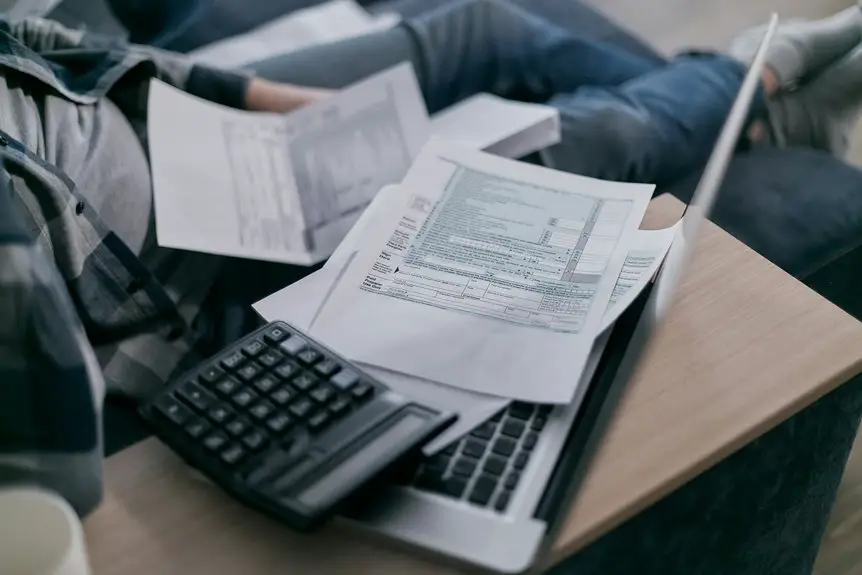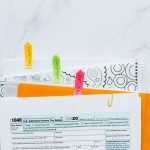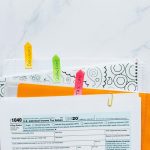Yes, you can deduct your business-use-of-home expenses even if your business isn’t profitable yet. The key requirement is that the space must be used exclusively for business purposes. Your efforts toward profitability can qualify you for these deductions, encompassing various expenses like mortgage interest, utilities, and supplies. It’s important to keep accurate records to support your claims. Want to know more about maximizing your deductions? There are some essential tips and considerations ahead.
Table of Contents
Key Takeaways
- You can still deduct home office expenses even if your business isn’t profitable, as long as you actively work towards profitability.
- The home office must be used exclusively for business to qualify for deductions, regardless of the business’s profitability.
- Keep accurate records of all expenses related to your home office to support your deduction claims.
- Deductible expenses include mortgage interest, utilities, and supplies, which can provide significant tax savings.
- Consult a tax professional to ensure compliance with IRS rules and optimize your deductions.
Understanding the Home Office Deduction
When you work from home, understanding the home office deduction can greatly impact your tax savings. This deduction allows you to write off certain expenses directly related to your workspace.
You can deduct a portion of your rent or mortgage, utilities, and even internet costs, as long as they’re used for your business. It simplifies your tax filing by letting you choose between the simplified method or the actual expense method.
The simplified method offers a flat rate per square foot, while the actual expense method can provide larger deductions based on your actual costs.
Either way, knowing how this deduction works helps you maximize your potential savings, making your home office a financially savvy choice for your business endeavor.
Eligibility Criteria for Home Office Deduction
To qualify for the home office deduction, you need to meet certain eligibility criteria.
First, your home office must be used exclusively for business purposes, and second, your business should be profitable.
Understanding these requirements is key to maximizing your deductions.
Profitability Requirement
Profitability plays an essential role in determining your eligibility for the home office deduction. The IRS expects you to operate your business with the intent to make a profit.
If your business hasn’t turned a profit yet, you can still qualify for the deduction, but there are conditions. You’ll need to show that you’re actively working toward profitability and not just running the business as a hobby.
Keep good records of your income and expenses, as these will be important in demonstrating your commitment. The IRS may closely scrutinize your situation if you consistently report losses, so it’s critical to have a clear plan for turning your business around.
Stay focused and proactive in achieving your business goals.
Exclusive Business Use
Operating your business with the intent to make a profit is just one aspect of qualifying for the home office deduction.
Another essential factor is “exclusive business use.” This means you must use a specific part of your home solely for your business activities. If you use your office for personal purposes, even occasionally, you can’t claim the deduction for that space.
To meet this criterion, designate a room or area specifically for your business; it shouldn’t serve any other purpose. Keep in mind that the IRS looks closely at this requirement, so make sure your setup is clear and documented.
If you meet the exclusive use test, you can take advantage of the home office deduction, even if your business isn’t profitable yet.
Types of Expenses You Can Deduct
When you run a home business, understanding which expenses you can deduct is crucial for maximizing your tax savings.
You can typically deduct a portion of your mortgage interest, rent, utilities, and property taxes based on the space used for your business. Additionally, expenses like internet and phone bills may qualify if they’re related to your business activities.
Supplies, such as paper, ink, or equipment, are also deductible. Don’t forget about business-related travel expenses, including mileage if you use your vehicle for work purposes.
If you hire help, wages or contractor fees are deductible too. Keeping accurate records guarantees you can substantiate these deductions come tax time.
The Importance of Exclusive Use
To qualify for many home business deductions, you must demonstrate exclusive use of a designated space in your home. This means that the area you claim for deductions should only be used for your business activities, not for personal use.
If you’ve set up a home office, it needs to be used solely for work tasks. Mixing business with personal activities in that space can jeopardize your ability to claim deductions.
The IRS looks closely at this requirement, so it’s essential to keep accurate records and possibly designate a specific room or area just for your business efforts.
The Impact of Profitability on Deductions
While you might be enthusiastic to deduct various home business expenses, your profitability plays an essential role in determining what you can claim. If your business isn’t profitable yet, you can still deduct certain expenses, but they may be limited.
Generally, you can only deduct losses against other income, so if you have no other income, your deductions mightn’t provide immediate tax benefits.
Keep in mind that the IRS requires you to demonstrate a profit motive. If you consistently report losses, they might question your business’s legitimacy.
To maintain your ability to deduct expenses, aim to show a profit within three out of five years. Understanding these rules will help you navigate your deductions more effectively.
Record Keeping for Home Office Expenses
Keeping accurate records for your home office expenses is vital for maximizing your deductions.
You’ll need to gather necessary documentation and find effective ways to track your expenses.
Let’s explore the best practices to guarantee you stay organized and compliant.
Necessary Documentation Requirements
Accurate record-keeping is essential for claiming home office expenses, as it not only supports your deductions but also protects you in case of an audit.
You’ll need to maintain detailed records of all expenses related to your home office. This includes utility bills, mortgage interest, property taxes, and repair costs.
Keep receipts and invoices for any supplies or equipment you purchase, and document how these expenses relate to your business.
If you’re using a portion of your home for business, calculate the percentage of your home that’s used for this purpose. This will help determine your deductible expenses.
Expense Tracking Methods
Effective expense tracking methods are essential for managing your home office finances. Start by organizing all your receipts and invoices in a dedicated folder, either physical or digital.
Use accounting software or apps to categorize expenses, making it easier to track and analyze your spending. Consider setting up a separate bank account for your business to simplify tracking and prevent mixing personal and business expenses.
Regularly update your records—weekly or monthly—to guarantee nothing slips through the cracks. Don’t forget to keep a log of your home office usage, noting the percentage of your home used for business.
This will help you calculate your deductions accurately. With consistent tracking, you’ll be better prepared for tax time and maximizing your deductions.
Filing Your Taxes With Home Office Deductions
When you run a home-based business, steering through tax season can feel overwhelming, especially when it comes to claiming your home office deductions.
To help simplify the process, keep these three key points in mind:
Simplifying your tax season starts with these three essential tips for claiming home office deductions.
- Determine Your Deduction Method: Choose between the simplified option (a standard rate per square foot) or the actual expense method (calculating specific costs like utilities and repairs).
- Document Everything: Maintain records of your expenses and the square footage of your home used for business to support your claim.
- Know the Limits: Remember that your deduction can’t exceed your business income, so if your business isn’t profitable yet, your deductions may be limited.
Common Mistakes to Avoid When Claiming Deductions
While claiming deductions for your home business can save you money, it’s easy to make mistakes that could cost you in the long run. Here are some common pitfalls to avoid:
| Mistake | Consequence | Tip to Avoid |
|---|---|---|
| Not keeping good records | Missed deductions | Organize receipts monthly |
| Claiming personal expenses | Audit risk | Separate business and personal |
| Miscalculating square footage | Incorrect deduction amount | Measure your workspace accurately |
| Ignoring local regulations | Legal issues | Check local tax rules |
Frequently Asked Questions
Can I Claim Home Office Deductions if I’M Just Starting My Business?
Yes, you can claim home office deductions even if you’re just starting your business. As long as you meet the requirements, you’ll benefit from tax deductions related to your home office expenses right from the start.
What if My Business Has No Income Yet?
If your business has no income yet, you can still track your expenses. You might not see immediate tax benefits, but documenting your costs helps prepare for future deductions when your business starts generating revenue.
Do I Need to Report Home Office Deductions Even if Unprofitable?
Picture your cozy workspace, brimming with potential. Even if your business isn’t profitable yet, you still need to report home office deductions. They can create a financial cushion, waiting for your venture to bloom.
How Can I Estimate My Home Office Expenses Accurately?
To estimate your home office expenses accurately, track your utility bills, rent, and any related costs. Divide these by the percentage of your home used for business to get a clear picture of your expenses.
Are There Limits on the Amount I Can Deduct if Unprofitable?
Sure, you can try deducting expenses, but it’s like pouring water into a bucket full of holes—your losses will limit how much you actually benefit. Keep your expectations realistic, or you’ll be disappointed!




